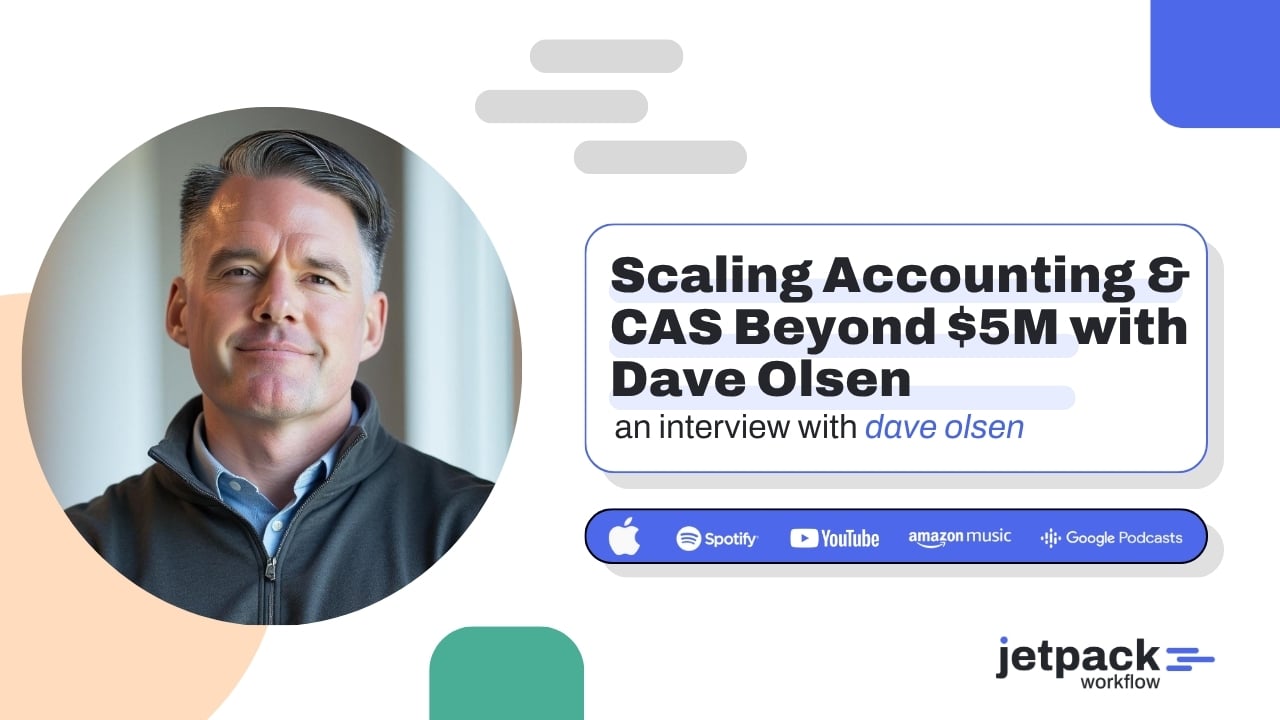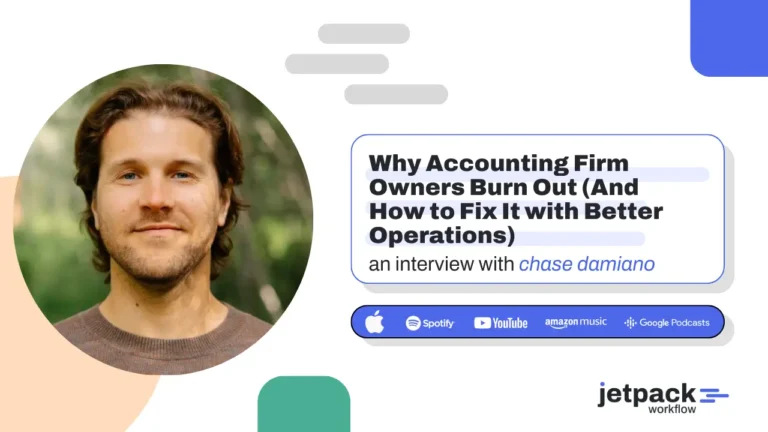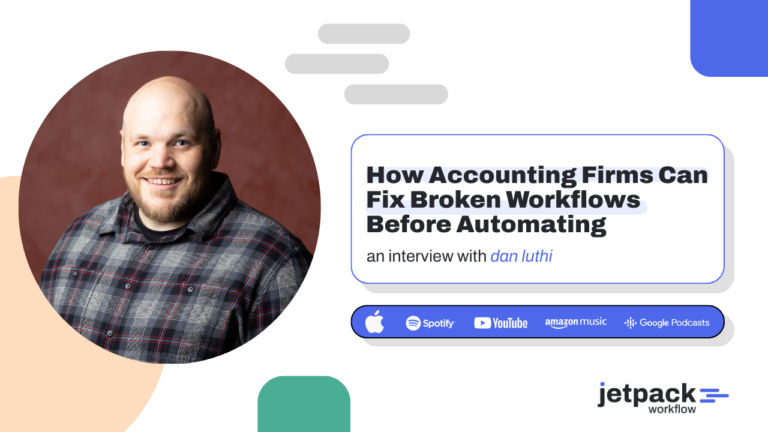Scaling Accounting & CAS Beyond $5M with Dave Olsen

Podcast
Summary
In this episode of Growing Your Firm, host David Cristello welcomes Dave Olsen, founder of an accounting firm and Nimbl Staffing. Dave shares his unique journey in the accounting industry, discussing the success of his staffing service and his exciting new venture into IT services for accounting firms. The conversation delves into the strategies behind building a solid foundation for business growth, including the structures necessary for launching new services. Listeners will gain insights into the process of expanding a business and the importance of having the bandwidth to innovate.
Tune in to discover how Dave navigates the challenges of running multiple services and what it takes to thrive in the accounting world.
Guest Bio
Biography of Dave Olsen
Dave Olsen is a visionary leader in the accounting and IT services industry, renowned for his innovative approach to business growth and operational efficiency. As the founder and CEO of Nimbl, a rapidly growing accounting firm, Dave has successfully navigated the complexities of the financial landscape, achieving remarkable milestones that reflect his commitment to excellence and client service.
With a career that began as a contract CFO, Dave honed his skills in financial management and strategic planning over a decade, from 2007 to 2017. During this time, he developed a keen understanding of the challenges faced by businesses in managing their financial operations. His early experiences laid the groundwork for his entrepreneurial journey, as he recognized the potential for creating a virtual accounting department that could serve clients more effectively through the use of cloud technology.
In 2018, Dave took a significant leap forward by hiring his first U.S. employee and forming a joint venture with a regional accounting firm. This partnership allowed him to leverage existing reputations and resources, leading to the creation of Tanalytics, which later rebranded as Nimbl. Under his leadership, Nimbl has grown to generate approximately $5 million in annual recurring revenue, employing around 70 professionals across the U.S. and the Philippines. This impressive growth trajectory is a testament to Dave’s ability to identify market opportunities and execute strategies that resonate with clients.
Dave’s philosophy centers on the importance of people in driving business success. He believes that hiring the right talent, providing comprehensive training, and fostering a culture of accountability are essential components of a thriving organization. His experiences have taught him that effective oversight and gradual onboarding processes are crucial for ensuring that new hires can contribute meaningfully to client relationships without compromising service quality. This people-first approach has not only enhanced Nimbl’s operational efficiency but has also cultivated a loyal client base that values the firm’s commitment to excellence.
In addition to his work at Nimbl, Dave has expanded his entrepreneurial endeavors by launching Nimbl Staffing, a service designed to help accounting firms find and manage offshore talent. This initiative arose from his own challenges in sourcing qualified professionals and reflects his belief in the power of collaboration and resource-sharing within the industry. By providing a streamlined staffing solution, Dave aims to alleviate the burdens faced by firms seeking to scale their operations while maintaining high standards of service.
Recognizing the growing need for IT support in a remote work environment, Dave has also ventured into the IT services sector. His decision to build an in-house IT team stemmed from a desire to address specific pain points that traditional outsourcing models failed to resolve. By fostering a culture of innovation and continuous improvement, he has empowered his team to develop tailored solutions that enhance operational security and efficiency for remote teams.
Dave’s journey is characterized by a relentless pursuit of knowledge and a commitment to lifelong learning. He actively engages with industry peers through conferences and networking groups, sharing insights and best practices that contribute to the collective growth of the accounting profession. His involvement in organizations such as the Accounting Salon underscores his dedication to fostering collaboration and knowledge-sharing among accounting professionals.
In summary, Dave Olsen is a dynamic leader whose career is marked by significant achievements in the accounting and IT services sectors. His innovative mindset, people-centric philosophy, and commitment to excellence have positioned him as a thought leader in the industry. As he continues to expand his ventures and explore new opportunities, Dave remains focused on building a legacy of success that empowers others to thrive in an ever-evolving business landscape.
The Importance of Structured Onboarding and Training Processes for New Hires
In a recent podcast episode featuring Dave Olsen, the critical role of structured onboarding and training processes for new hires is underscored as essential for maintaining high-quality client service. Here are some key points that illustrate why these processes are vital:
1. Preventing Client Disruptions
Dave Olsen shares his experience of hastily placing new hires in client-facing roles, which often resulted in service disruptions. When employees are not adequately prepared, they may struggle to meet client expectations, leading to dissatisfaction and potential loss of business. By implementing a structured onboarding process, firms can ensure that new hires are well-equipped to handle client interactions with confidence and competence.
2. Gradual Integration into Client Work
Olsen discusses the transition from onboarding new hires within days to a more measured approach that spans weeks. This gradual integration allows new employees to familiarize themselves with the company’s systems, processes, and culture before engaging directly with clients. By easing them into their roles, firms can mitigate the risks associated with inexperienced staff managing client relationships.
3. Tailored Training Programs
The episode highlights the importance of providing tailored training that aligns with the specific needs of the firm and its clients. Olsen notes that he learned the hard way that assuming new hires would know what to do without proper training can lead to significant issues. A structured training program can address the unique challenges of the firm and prepare employees to handle various client scenarios effectively.
4. Oversight and Support
Providing oversight during the onboarding process is crucial. Olsen emphasizes that new hires should receive guidance and support as they learn the ropes. This oversight not only helps them develop their skills but also allows management to identify potential issues early on. By monitoring their progress, firms can make informed decisions about when to allow new hires to take on more responsibilities.
5. Long-Term Employee Development
Structured onboarding and training processes contribute to long-term employee development. Olsen mentions that retaining underperforming employees out of good intentions can hinder growth. By investing in a robust onboarding program, firms can better identify the right fit for their culture and client needs, ultimately leading to a more competent and engaged workforce.
6. Enhancing Client Relationships
When new hires are well-trained and confident in their roles, they can build stronger relationships with clients. Olsen points out that a well-prepared employee can provide better service, leading to increased client satisfaction and loyalty. This positive experience not only benefits the client but also enhances the firm’s reputation in the industry.
In conclusion, structured onboarding and training processes are vital for ensuring that new hires are adequately prepared before interacting with clients. By investing in these processes, firms can prevent disruptions in client service, enhance employee development, and ultimately foster stronger client relationships.
The Journey of Scaling an Accounting Firm: Insights from Dave Olsen
In the latest episode of the Growing Your Firm podcast, host David Cristello interviews Dave Olsen, founder of Nimbl, who shares his remarkable journey of scaling his accounting firm and expanding into new service areas. Here are some key insights from the conversation:
Initial Growth and the Formation of Nimbl
Dave Olsen’s accounting firm began as a solo contract CFO service in 2007. Over the years, he gradually built a team, hiring his first U.S. employee in 2018. By leveraging cloud software and offshore staffing, he created a virtual accounting department that catered to small and mid-sized businesses.
Key Milestones:
- 2018: Partnered with a regional accounting firm to create a joint venture called Tanalytics, which allowed him to scale quickly.
- Growth: The firm grew from $500,000 in annual recurring revenue to approximately $1.3 million after the joint venture, eventually reaching $5 million with a team of 70 people.
Lessons Learned in Scaling
Dave emphasizes that the journey of scaling a firm is fraught with challenges, particularly in managing people. He learned several important lessons:
- Hiring and Training: Initially, he assumed that new hires would know what to do without much oversight. This led to significant issues, prompting him to realize the importance of providing thorough training and ongoing support.
- Identifying Fit: One of the biggest challenges was holding onto underperforming employees out of good intentions. Dave learned to make tough decisions earlier, which ultimately catalyzed growth.
- Structured Onboarding: He shifted from onboarding new hires in days to weeks, allowing them to acclimate and learn the systems before interacting with clients.
Team Structure and Client Management
Nimbl employs a structured team approach, with each client typically served by a three-person team consisting of:
- A Philippines-based accounting specialist or bookkeeper.
- A client manager who serves as the primary contact.
- A controller who provides technical support and oversight.
This structure allows for better client service and risk management, particularly as the firm scales.
Expanding Services: Offshoring and IT
Dave’s journey didn’t stop with accounting services. He also ventured into offshoring and IT services:
Nimbl Staffing
- Origin: The idea for Nimbl Staffing emerged from Dave’s own challenges in hiring offshore talent. He partnered with a local entrepreneur in the Philippines to create a staffing solution that alleviated the pain points he experienced.
- Business Model: Nimbl Staffing operates on an exclusive contract basis, allowing them to hire and manage talent for other firms, thus providing a valuable service to the accounting community.
IT Services
- Need for IT: As the firm grew, Dave recognized the need for robust IT support, particularly for remote work. Traditional outsourcing options were not meeting their needs, leading him to explore building an in-house IT service.
- Development: With the help of a talented team member, Nathan, they began developing IT solutions tailored for remote companies, focusing on device management and help desk support.
Future Aspirations
Despite receiving numerous inquiries about selling his firm, Dave remains focused on building and expanding Nimbl. He sees significant potential in the accounting industry and is committed to creating innovative solutions that address the evolving needs of clients.
Conclusion
Dave Olsen’s journey illustrates the complexities and rewards of scaling an accounting firm. His insights on hiring, team structure, and service expansion provide valuable lessons for other firm owners looking to grow their businesses. As he continues to innovate with Nimbl, the accounting community can look forward to more advancements in service delivery and operational efficiency.
Recognizing the Need for Organizational Restructuring at Various Growth Stages
As businesses grow, particularly in the accounting sector, the need for organizational restructuring becomes increasingly apparent. This is especially true around the $1 million revenue mark, where companies often face challenges that necessitate a reevaluation of their internal structures and processes.
The $1 Million Revenue Mark: A Critical Inflection Point
In the podcast episode featuring Dave Olsen, founder of Nimbl, he highlights that the transition from a smaller operation to a more structured organization often occurs around the $1 million revenue mark. At this stage, businesses typically experience a significant increase in client volume and complexity, which can strain existing systems and processes.
Dave notes that when he was transitioning from a solo CFO to managing a larger team, he realized that the informal structures that worked in the early days were no longer sufficient. The need for a more organized approach became clear as he began to hire additional staff and take on more clients.
Key Changes in Organizational Structure
- From Pool to Pods: Initially, Dave’s team operated as a pool of resources assigned to clients as needed. However, as the business grew, this model became inefficient. By restructuring into “pods,” where each pod consists of a dedicated team for a set of clients, Nimbl was able to improve accountability and service delivery. Each pod typically includes a client manager, a controller, and accounting specialists, ensuring that clients receive consistent and focused attention.
- Access Control and Security: With growth came the realization that security protocols needed to be tightened. In the early stages, all team members had access to all client information, which posed significant risks. As the company approached the $3 million mark, they implemented a more structured access control system, ensuring that team members only had access to the information necessary for their roles. This change not only improved security but also streamlined operations.
- Leadership Structure: As the organization expanded, the leadership structure also needed to evolve. Dave mentioned that as they grew, they had to rethink how teams were organized and led. The introduction of pod leaders helped to create a more defined hierarchy and accountability within the teams, which is crucial for maintaining efficiency as the number of clients and employees increases.
Lessons Learned
Dave emphasizes that one of the most significant lessons learned during this growth journey is the importance of being adaptable. He acknowledges that no matter how well a structure is designed at one stage, it will likely need to be re-evaluated and restructured as the business continues to grow. This iterative approach to organizational design allows companies to remain agile and responsive to changing business needs.
Additionally, he points out that hiring the right people and providing them with adequate training and oversight is essential. Early mistakes in assuming that new hires would automatically know how to perform their roles led to setbacks. By investing time in onboarding and gradually increasing responsibilities, businesses can foster a more competent and confident workforce.
Conclusion
Recognizing the need for organizational restructuring at various growth stages is vital for any business aiming to scale effectively. The insights shared by Dave Olsen illustrate that around the $1 million revenue mark, companies must be prepared to adapt their structures, processes, and team dynamics to enhance efficiency and meet the demands of a growing client base. By embracing change and focusing on the right organizational strategies, firms can position themselves for sustained success in a competitive landscape.
The Journey of Scaling an Accounting Firm: Insights from Dave Olsen
In the latest episode of the Growing Your Firm podcast, host David Cristello interviews Dave Olsen, founder of Nimbl, who shares his remarkable journey of scaling his accounting firm and launching additional services. Here are some key insights from the conversation:
Initial Growth and the Formation of Nimbl
Dave Olsen’s accounting firm began as a solo contract CFO service in 2007. Over the years, he gradually built a team, hiring his first U.S. employee in 2018. By leveraging cloud software and offshore staffing, he created a virtual accounting department that catered to small and mid-sized businesses.
Key Milestones:
- 2018: Partnered with a regional accounting firm to create a joint venture called Tanalytics, which allowed him to scale quickly.
- Growth: The firm grew from $500,000 in annual recurring revenue to approximately $1.3 million after the joint venture, eventually reaching $5 million with a team of 70 people.
Lessons Learned in Scaling
Dave emphasizes that the journey of scaling his firm was not without its challenges. One of the most significant lessons he learned was the importance of hiring the right people and providing adequate training and oversight.
Key Takeaways:
- Hiring Mistakes: Early on, Dave made the mistake of assuming that new hires would know what to do without sufficient training. This led to significant setbacks.
- People-Centric Growth: He learned that the success of the firm heavily relies on the people within it. Making tough decisions about personnel early on can lead to better outcomes.
Structuring Teams for Success
As the firm grew, Dave recognized the need to restructure his teams to maintain efficiency and client satisfaction. He moved from a pool of employees assigned to clients to a more structured pod system.
Team Structure:
- Each client is served by a dedicated team consisting of a client manager, a controller, and a bookkeeping specialist.
- This structure allows for better accountability and service delivery, with each pod managing a specific set of clients.
Expanding Services: Offshoring and IT
In addition to his accounting services, Dave has ventured into offshoring and IT services. His experience with offshore staffing began in 2012, and he eventually formalized this into a separate entity, Nimbl Staffing, to help other firms find talent without the hassle of the hiring process.
IT Services Development:
- Recognizing the challenges of managing IT needs for a remote workforce, Dave decided to build an in-house IT service rather than outsourcing it. This decision stemmed from frustrations with existing IT service providers who did not meet his firm’s specific needs.
- By hiring a talented intern with a background in information systems, Dave was able to develop a robust IT service that could cater to the unique requirements of remote work.
Future Aspirations
Despite receiving numerous offers to sell his firm, Dave remains focused on building and expanding his services. He is particularly excited about the potential of his new IT venture and the lessons learned from recent acquisitions, such as Brilliant Numbers, which he acquired to further enhance his firm’s capabilities.
Conclusion
Dave Olsen’s journey illustrates the complexities and rewards of scaling an accounting firm. His emphasis on people, structured teams, and the willingness to adapt and innovate are crucial elements that have contributed to his success. As he continues to explore new opportunities, his story serves as an inspiration for other firm owners looking to grow and evolve in a competitive landscape.
The Value of Organic Growth Opportunities: Partnerships and Acquisitions
In the podcast episode featuring Dave Olsen, founder of Nimbl, the discussion highlights the significant role that organic growth opportunities, such as partnerships and acquisitions, play in expanding service offerings and gaining valuable business experience. Two key examples from Dave’s journey illustrate this concept: the launch of Nimbl Staffing and the acquisition of Brilliant Numbers.
Launch of Nimbl Staffing
The inception of Nimbl Staffing was a direct response to the challenges Dave faced while building his accounting firm. After experiencing the difficulties of hiring offshore talent, he recognized a gap in the market for a more streamlined staffing solution. This realization led to an organic partnership with Kathy, an entrepreneurial individual he had hired from the Philippines.
Kathy proposed the idea of building a staffing business to alleviate the hiring pains that Dave had encountered. This partnership allowed Dave to leverage Kathy’s local knowledge and resources, enabling him to offer staffing solutions not only for his firm but also for other accounting firms facing similar challenges. The organic nature of this growth opportunity was crucial; it stemmed from a need within the business and evolved into a service that provided value to others in the industry.
Acquisition of Brilliant Numbers
The acquisition of Brilliant Numbers further exemplifies the benefits of pursuing organic growth opportunities. This acquisition was not a result of a proactive search for growth but rather an opportunistic move that aligned with Dave’s long-term vision for Nimbl. When Susan, the owner of Brilliant Numbers, decided to retire, it presented a unique chance for Dave to expand his client base and service offerings.
By acquiring Brilliant Numbers, Dave was able to integrate a well-established firm with a similar client demographic and service model. This acquisition not only added to Nimbl’s revenue but also provided a learning opportunity for Dave and his team. The transition allowed them to understand the intricacies of merging different business cultures and operational practices, which is invaluable experience for future growth endeavors.
Learning from New Business Experiences
Both the launch of Nimbl Staffing and the acquisition of Brilliant Numbers highlight the importance of learning from new business experiences. Dave emphasized that these organic growth opportunities were not just about expanding the business but also about gaining insights that could be applied to future initiatives.
For instance, the staffing venture taught Dave about the complexities of managing a remote workforce and the importance of having robust training and oversight processes. Similarly, the acquisition experience provided lessons in client integration and operational alignment, which are critical for maintaining service quality and client satisfaction.
Conclusion
In conclusion, the value of organic growth opportunities, such as partnerships and acquisitions, is evident in Dave Olsen’s journey with Nimbl. These strategies not only facilitate the expansion of service offerings but also provide essential learning experiences that contribute to the overall growth and resilience of the business. By embracing these organic opportunities, firms can adapt to market demands, enhance their service capabilities, and ultimately drive sustainable growth.
Timestamps
[00:01:38] Accounting firm growth journey.
[00:04:19] Partnership dynamics in business growth.
[00:09:30] Finding fit faster in hiring.
[00:12:04] Team structure evolution.
[00:15:12] Pod structure and client base.
[00:19:34] Acquisition of Brilliant Numbers.
[00:24:15] Staffing and partnership structure.
[00:28:42] Expanding in-house IT capabilities.
[00:30:22] Networking at conferences.





